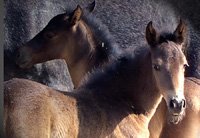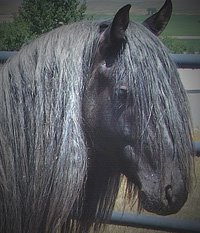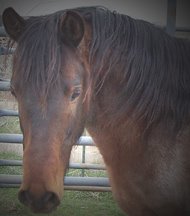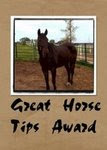I'm sure that this comment won't be very popular, but if people know that there is a good chance of horses suffering from this gastric problem, why are these animals pushed to that extent? They are living things, not machines. What is wrong with moderation? I have watched many people in the Dressage World push their horses until they break down...and dump them. All for the glory of the person at the expense of the animal. Why do we do this?
In other words, is it morally acceptable to engage our equine partners in rigorous athletic competition, such as endurance riding, knowing full well that doing so adds a risk factor for EGUS?
It's a fair question, one I've considered at length throughout my research on Equine Gastric Ulcer Syndrome (EGUS). I believe it's worthy of further discussion.
Note that Lori includes sports other than endurance in her question. She is right to do so; in fact, 60% - 90% of performance horse across all disciplines appear to be affected by gastric ulcers. Endurance seems to fall on the lower end of this range; all the same, 67% represents a lot of horses.
The question grows more complex when we consider that not only performance horses are affected. In fact, nearly all domestic horses are at risk, and as little as an hour's training per day can result in ulcer formation. Furthermore, a great many ulcer cases are asymptomatic, apparently causing no distress to the horse.
Moderation is, as Lori suggests, an option...but it still won't solve the problem. Simply stalling a horse, or failing to keep hay in front of him, or administering frequent doses of bute to relieve pain from other medical problems, can result in EGUS (and a host of other ailments). Equines ranging from old schoolies to greenies just starting under saddle are at risk.
To eliminate EGUS, we would have us give up horsekeeping altogether. However, turning our horses loose in the Nevada desert to be rounded up by the BLM and sent to slaughter seems an imperfect solution. (Ahem. Shall we avoid a slaughter debate, please? If you want to discuss that issue, make tracks to the nearest online horse forum and knock yourself out.)
So, should we compete in equine sports? Should only those individuals who can provide 20 acres of quality pasture per horse be allowed to keep them...and ride them only lightly, if at all? Is there an acceptable middle ground? Where do you draw the line, and why?
_________________________________________________________
Related Posts
Pharmaceutical and Alternative Treatment Options for Equine Gastric Ulcer Syndrome
Equine Ulcer Supplement Options
EGUS, Endurance, and the AERC
Bringing it Home: EGUS Prevention at In the Night Farm
The Good Bad News: Gastric Ulcers in Equines
_________________________________________________________
Want to read more posts like this one? We deliver!
Subscribe to The Barb Wire









4 comments:
Tamara...thank you so much for addressing my concerns. I know I am an animal mush, but what is the point of sacrificing your animal for a particular accomplishment? Look at this great horse I have...how high can I make him jump to stroke my ego? I'm sure many people who compete will not be happy with me, but I always tend to advocate for the animal.
You seem to be a very responsible horse person and post useful information..
Lori
This is an interesting post and I think that the question being asked here is one that has crossed the minds of many responsible horse owners. The key word here is "responsible." We are our horses' caretakers and it is our "responsibility" to know what is best for them. When the discipline becomes more important than the care of the horse, then I would question the ego and ethics of anyone with this viewpoint. On the other hand, if you are a strong competitor in something and your horse comes up with (any) health problem that interferes with competition -- the choice to back off from competing or step out entirely for the sake of the horse is most certainly a noble one. I think the ultimate answer to the question is that any responsible, CARING horse owner is going to put their horse's welfare above that of competition.
In making the CORRECT decision, a good horse owner is going to look to other experienced horse owners (whom they trust), horse care professionals, and especially the advice of a good veterinarian to make an informed decision that is in the best interest of the horse. Reseaching the problem on your own also has a place in this as well (exactly what Tamara is doing with the Ulcer problems). The better informed we are, the more potential we have to make the best decision. If a horse's health issue is minor or managable, they may still be able to compete with properly managed care and a watchful, CARING owner (and if the need arises to be pulled out of competition entirely). Remaining in competition isn't always a bad choice if the decision is not taken lightly, the proper research is done, and RESPOSIBLE choices are made.
At the present time, I - personally, do not compete. My horse is a senior citizen who has payed his dues at the racetrack. I do everything in my power to ensure that he is happy with what we choose to do in spending our time together. My boy has some arthritis in his hocks. I do my best to help him stay comfortable with regular LIGHT exercise, joint supplements, massage, and liniments. I am very observant to his attitude in everything that we do. I know I need to listen to him to know what is just right and what is too much. I watch his facial expressions, palpate his legs (for heat/swelling), and take note how eager he is to do things. I make a point to not push him. If I question anything, I research it and talk to my vet. I honestly feel that I take excellent care of my horse. I also know that there are people out there that would not agree with me. There are animal activists, for example, that feel ANY kind of riding is wrong. Some feel horses should live free and wild and not be messed with by people. My personal feeling on that is that it is a nieve way of looking at things -- an extreme,if you will. If a horse is in pain with being ridden, YES- then they shouldn't be ridden. If they are eager to hit the trail and want to go out -- then why is that wrong? If you can manage an issue and keep them happy so that they still want to go out and compete, I don't think it's wrong. If a health problem affects them so that they don't want to compete, then forcing them is wrong. You have to know your horse to know what is best and that creates a controversial line. Some people draw that line in different places.
I think the answer to this question lies with a lot of variables. The type of bond they have and how well each rider knows their horse is at the heart of this. My belief is that horses that work their entire lives in a discipline should be entitled to a nice retirement (with the owners they worked for). Unfortunatley I know this is not always the case. Many owners dump their horses when they can't perform anymore. Some owners donate them to therapy programs or find a family that can ride them only lightly. Is this a humane choice? maybe.....If they are willing to take the horse back and provide for it's well being if needed -- then I think that's probably an OK choice. On the the other hand, if the therapy program sells them, and they get sold again and again and then they end up in a slaughter house -- that's not such a good end. It sounds sweet to say "Oh, he went to this therapy program -- but is he really still there?" A responsible owner would know.
SOooo.. when it comes to competing, I think it comes down to knowing what is a "responsible" thing. Managing a horse's needs, keeping them comfortable, and HAPPY is what responsible people do. YES, you have to look beyond ego to do this....and YES, there are people that do not. I think that knowing what's right is something that comes from inside your own heart. I try to treat my own horse how I would want to be treated if I were in his shoes. I can't tell you how many times I wish he could TALK to me. Since he can't, I communicate with him in the best way I can and follow my heart in knowing what is right for him. I know that there will always be someone out there that will disagree with me. I have no choice but to live with that as it is not possible to make everyone agree with me. I take comfort in knowing that my horse will always have a home where he is loved and I will always do my best to make sure that he comfortable and happy. There will always be people out there that will be more concerned with the competition than the horse and they may not have a conscience when it comes to what their horse wants. We can voice our opinions, we can get angry, and if we get lucky -- we might be able to save the horse if they are trying to get rid of them -- but we aren't going to change them. We have no choice but to take comfort in knowing that we are DOING OUR BEST in trying to ensure that our horses have good lives.
Lori,
You sound like a wonderful person who truly cares about her horses. I think being tough and thick skinned is way overated, so there's nothing wrong with being mushy if it means you care. I believe it take more courage to care and say something then it does to be thick skinned and silent (which, to me, seems more cowardly).
Tamara,
The fact that you research Aruba's ulcers so thoroughly is testimony to the fact that you want to do right by him. That puts you in a class of responsible competitiors. There is nothing wrong with that - especially if you succeed over someone who is not (and only in it for the ego).
Sorry - didn't meant to make my comment so long *sigh* but that's it -- for what it's worth.
Carol
Lori, I think you're right in saying that it's all about the rider's ego. That's my problem with most competitive animal sports.
Low level dressage seems to have a fairly good ratio of caring horsepeople to wannabe GP DQ's, and endurance, for the most part, seems to be the same. That's why I'm interested in those two types of riding.
I think the real test is "what does that person do after her horse breaks down?" If you know the risks, look back after the fact to see if you made mistakes, LEARN FROM THOSE MISTAKES, and rehab / pasture pet the horse, then that's just life to me. My horse can find a way to hurt himself in a horse-safe pasture with his horsey BFF. For that matter, I could fall down my steps and break an ankle on the way to work. Life is risk. Really living, to me, is all about knowing the risks, minimizing them, and having fun anyway.
(And obviously you should make sure your horse's personality matches with the discipline you pursue. Aaruba would probably be a horrible Arab Western Pleasure mount, and my own favorite horse would be a laughable barrel horse.)
No problem, Lori -- as I said, it's a fair question. :-)
Carol -- WOW! Thanks for taking the time to respond so thoroughly. Your conclusion is very much like mine.
ROFL, Funder, at the idea of Aaruba attempting Western Pleasure. Not a chance!
Post a Comment